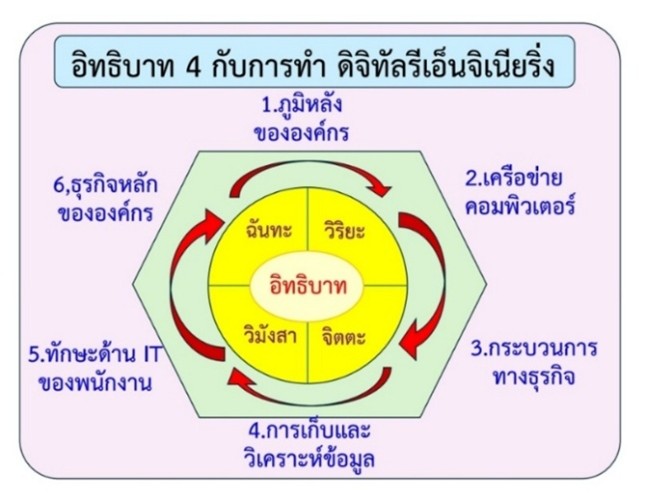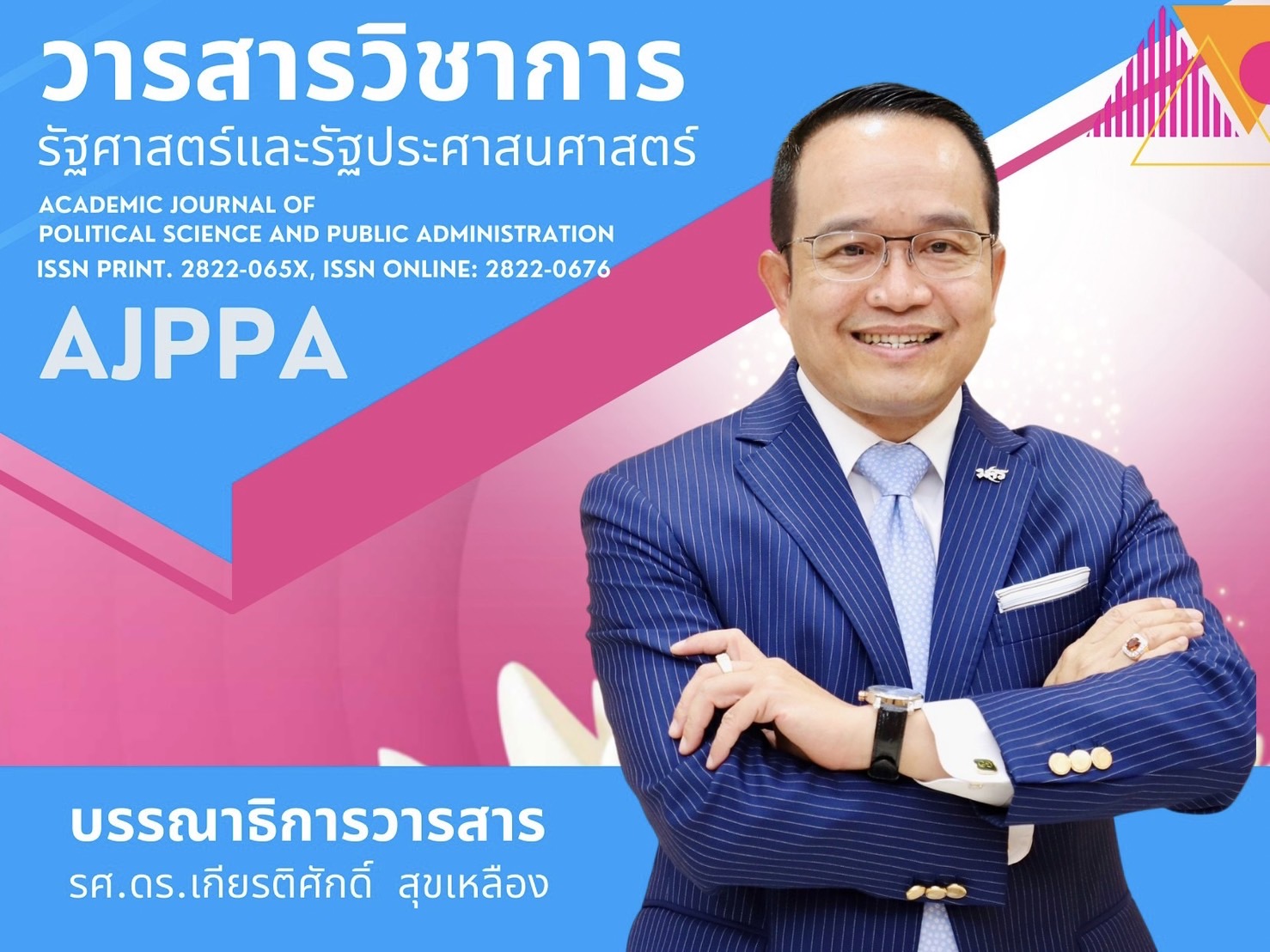BUDDHIST PRINCIPLES AND DIGITAL REENGINEERING IN THE NEW NORMAL ERA
Keywords:
Buddhist Principles Four Iddhipada, Digital Reengineering, New NormalAbstract
This academic article aims to present the concept of improving organizational management in the post-COVID-19 era, which began in December 2019 and spread worldwide. It has affected people’s lives and economies worldwide. Due to lockdown measures and social distancing measures, society and economy have entered the “New Normal” era. Organizations must improve their work processes to respond to the new social system, which uses more digital technology in daily life. Organizational development scholars have suggested that organizations should reengineer the digital technology systems used before the COVID-19 outbreak to respond to business operations in the new normal era, called “Digital Reengineering”. In this digital technology reengineering process, it must be carried out by the organization’s personnel. In this article, the author suggests using Buddhist Principles; The Four Iddhipada as part of the development process because they are the principles of success that can help create work efficiency. This principle explains four types of meditation: Chandasamadhi, Viriyasamadhi, Cittasamadhi, and Vimansamadhi. The Four Iddhipada are also a concept for selecting people to perform different duties because each person has a different background and personality. Some people like to work on things they love (Chanda), some people are diligent and not afraid of hard work (Viriya), some people have a habit of focusing on their work (Chitta) and some people like work that requires inventing, researching, and testing new things (Vimangsa). Using the Four Iddhipada as the principles for work will help the development and improvement of various work systems.
References
กองระบาดวิทยา กรมควบคุมโรค. (2567). สถานการณ์โรคติดเชื้อไวรัสโคโรนา 2019 (COVID-19) ประเทศไทย. สืบค้น 1 สิงหาคม 2567, จาก https://shorturl.asia/2iTcU.
ไกรวัลย์ ศรีสวัสดิ์. (2537). การ Reengineering ของ บมจ. ธนาคารกสิกรไทย: บทเรียนสำหรับระบบราชการไทย. กรุงเทพ: คณะรัฐศาสตร์ มหาวิทยาลัยธรรมศาสตร์.
ธนาคารแห่งประเทศไทย. (2567). ธุรกรรมการโอนและชำระเงินผ่านบริการพร้อมเพย์. สืบค้น 31 ตุลาคม. 2567, จาก https://shorturl.asia/UPezH.
ธนาคารแห่งประเทศไทย. (2567). รายงานแนวโน้มธุรกิจ ไตรมาสที่ 3/2567, สืบค้น 31 กรกฎาคม 2567, จาก https://shorturl.asia/i75UZ.
ปิยะ ปะตังทา และคณะ 2566). การพัฒนาสมรรถนะเชิงพุทธเพื่อการเรียนรู้เทคโนโลยีดิจิทัลของบุคลากรศาลปกครอง. วารสาร มจร สังคมศาสตร์ปริทรรศน์. 12(2), 1-13.
พระพัฒนพล สิริสุวณฺโณ (เพ็ชรไชย) และวิทยา ทองดี. (2565). การจัดการเรียนรู้วิถีใหม่ภายใต้การแพร่ระบาดของโรค Covid-19. วารสาร มจร อุบลปริทรรศน์. 7(3). 556-567.
พระพุทธโฆษาจารย์ (ป.อ.ปยุตฺโต). (2560). การเพิ่มประสิทธิภาพในการทำงาน (พิมพ์ครั้งที่ 36). กรุงเทพฯ: สำนักพิมพ์ ธรรมสภา บันลือธรรม.
พระพุทธโฆษาจารย์ (ป.อ.ปยุตฺโต). (2564). อิทธิบาท. พจนานุกรมพุทธศาสน์ ฉบับประมวลศัพท์. กรุงเทพฯ: สำนักพิมพ์ ธรรมสภา บันลือธรรม.
มลธิดา อุบลรัตน์. (2565). หลักอิทธิบาท 4 : เพิ่มประสิทธิภาพการปฏิบัติงานให้มีความสุข. วารสารสหวิทยาการนวัตกรรมปริทรรศน์. 5(2), 150-161.
มหาวิทยาลัยมหาจุฬาลงกรณราชวิทยาลัย. (2564). มจร ร่วมกับ รพ.ราชธานี เปิดโรงพยาบาลสนาม รองรับผู้ป่วยโควิด-19. สืบค้น 1 ตุลาคม 2567. จาก https://www.mcu.ac.th/news/detail/36167.
ยง ภู่วรวรรณ. (2564). โควิด19 ภูมิคุ้มกันหมู่ทำให้โรคยุติได้จริงหรือ. วารสารกุมารเวชศาสตร์, 60(3), 165-167.
อนุตรา รัตน์นราทร. (2563). รายงานผู้ป่วยโรคติดเชื้อไวรัสโคโรนา 2019 (COVID-19) : ผู้ป่วยรายแรกของประเทศไทยและนอกประเทศจีน. วารสารสถาบันบำราศนราดูร. 14(2), 116-123.
อรุณัฐ ปุณยกนก. (2567). แผนพัฒนารัฐบาลดิจิทัลของประเทศไทย : การประยุกต์หลักพุทธธรรมเพื่อความสำเร็จ. วารสารบัณฑิตศึกษาวิชาการ. 2(4). 42-49.
Ganesh, N. (2021), Digital Reengineering: Corporate Success in the Post-COVID World Retrieved 15 October 2024, form https://www.isb.edu/content/dam/sites
Michael Hammer. (1990). Reengineering Work: Don’t Automate, Obliterate. Harvard Business Review, 68, 104-112.
Oweera. (2560). บันทึกหมายเหตุอ้างอิง KBank Reengineering ปี 2538. 16 กันยายน 2560: สืบค้น 15 ตุลาคม 2567, จาก https://oweera.blogspot.com/2017/09/kbank-reengineering-2538.html
WHO. World Health Organization. (2020). Naming the coronavirus disease (COVID-19) and the virus that causes it. สืบค้น 1 พฤศจิกายน 2567, จาก https:// shorturl.asia/W2pcP.

Downloads
Published
How to Cite
Issue
Section
Categories
License
Copyright (c) 2025 Academic Journal of Political Science and Public Administration

This work is licensed under a Creative Commons Attribution-NonCommercial-NoDerivatives 4.0 International License.




